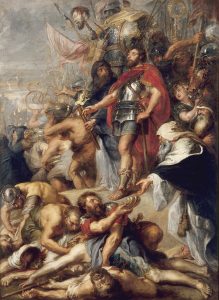
Handel, who was born in Halle (now part of Germany), moved to London fairly early in his career with the intention of popularizing Italian opera there. Between 1711 and 1740, he composed a slew of operas, some of the greatest ever created. For a while, the English audience ate them up. But eventually, Londoners tired of Italian opera, so Handel stopped writing his beloved operas and basically came up with a new form of music, the English oratorio, to keep selling tickets. His last opera was Deidamia, composed in 1740. His last oratorio was Jeptha, composed in 1751, at the age of 66, eight years before he died.
Handel’s oratorios were incredibly popular in his time, which was not surprising since they were sung in English and more accessible. Everyone has heard the famous Hallelujah Chorus from Messiah — one of the most rousing and best-known pieces of music ever created.
Overall, the oratorios are amazing — very much like operas, only without acting. Handel’s oratorios also have more chorus parts than his operas typically have. Most but not all have Biblical themes. My favorites:
- Messiah, HWV 56. Composed in 1741. The Hallelujah Chorus is incredible, but the rest of the oratorio is at nearly the same level.
- Israel in Egypt, HWV 54. The Felix Mendelssohn arrangement is spectacular — not surprising, since Mendelssohn had a flair for the dramatic on par with Handel’s. The story is about how Moses led the Israelites out of bondage. (It’s in German.)
- Judas Maccabaeus, HWV 63. Composed in 1746, the oratorio has moments so dramatic they will send shivers running up and down your spine. It’s the telling of the Old Testament story of Judas rallying the Jews against the oppressors.
A few excerpts:
(Image Credit – Wikimedia Commons)
